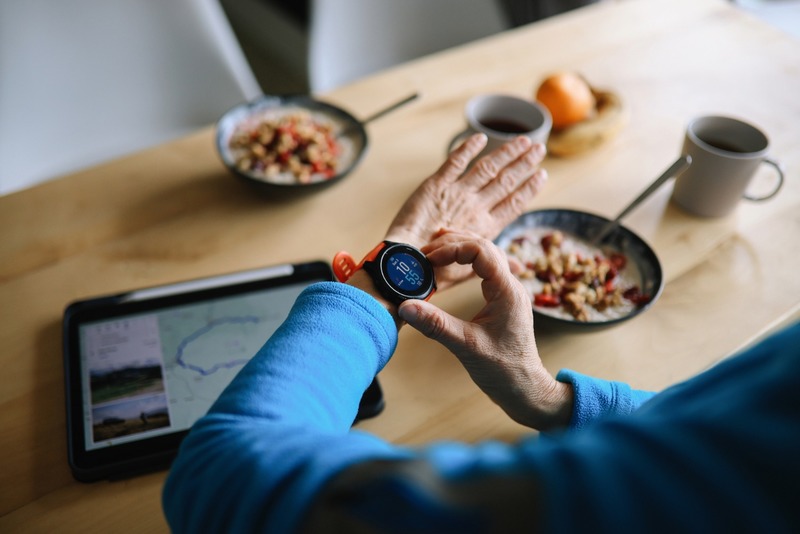News
Vail Doc Swims English Channel
If you're Dr. Tom Hackett swimming the English Channel is the second most fun you can have in the dark.
It really was a dark and stormy night when Hackett orthopaedic surgeon with the Steadman Clinic swam 34 miles across the English Channel in 62 degree water starting at 3 a.m. in 6-foot seas that tossed him around like the flotsam he kept colliding with.
Through the first four hours or so he stopped every 10 or 15 minutes to vomit and wretch from the seasickness.
It was miserable. I loved it Hackett said smiling.
Hackett has been a carpenter a ski patroller and mountain guide. The orthopaedic surgeon gig with the Steadman Philippon Clinic is pretty much his first indoor job.
I'm used to being cold he said.
While he was heaving and wretching and trying not to die he took two direct jellyfish hits. They hurt as much as advertised. The first was in the pitch black of pre-dawn. The second was at dawn. He had one of those moments several actually when he thought this might not have been his best idea ever.
I couldn't get that idea out of my head he said.
Select swimmers
You hear about people swimming the English Channel the first was Captain Matthew Webb in 1875 but almost no one ever does. When you're done you get to add your name to a list of channel swimmers written on the wall of the White Horse Pub in England. That's the whole payoff and it's a short list.
It's 25 miles in a straight line and the shortest distance between two points remains a straight line. But ocean currents don't run in a straight line and neither do you if you're fighting to swim through them.
To make it an official Channel swim you work through the Channel Swimming Association. You have to hire a certified boat pilot someone who knows the water the currents and who'll do as much as possible to keep you alive even if you've apparently abandoned your sense of self preservation. Stuart Gleeson captained Hackett's pilot boat.
The Channel Swimming Association sends an observer to make sure you don't cheat which you do by touching the boat or wearing something anything you're not supposed to wear. You don't get to wear much: Speedo swim trunks goggles and a thin cap not insulated. No wetsuits because they provide warmth and buoyancy.
It's the English Channel after all. Warmth and buoyancy are frowned upon.
So Hackett created his own insulation by packing on 15 pounds before his attempt. It was tougher than you might think he said. He was training like a mad man so he had to stuff himself with food that might not appear on the training table of your average Spartan athlete most of the Local Joe's menu he said.
Reap (tide) what you sow
Because the currents and tides will make several attempts to kill you you can only swim the English Channel when reap tides rule those seas. Reap tides only happen during a new moon and it's a three-day window two or three months a year. Any other time the water is too cold or the seas are too rough.
Hackett's window of opportunity was last week Aug. 23. He was sitting around his hotel room waiting when Gleeson called at 7 p.m. telling him to be on the docks at 2 a.m. He left his hotel at 1 a.m. Traffic was light.
Hackett started at Dover as in the White Cliffs of Dover and headed toward France but not right away.
When Gleeson put to sea the closest he could safely get to shore was about 400 yards. The water was too shallow.
So Hackett's English Channel adventure started with a 400-yard swim back to the England coast. He stood up turned around faced France and wondered if this was his most inspired idea.
He thought There are easier ways to get to France.
He questioned his judgment and wisdom and it's a simple question.
How much are you willing to suffer? he said.
But he went anyway.
In those predawn hours the only way to keep track of him was the glow sticks attached to his goggles if you don't count listening for seasickness sounds or his groans when he was stung by jellyfish twice.
He remembers his exact words when that second jellyfish hit him.
I don't think this is my day he said.
Yes it is! yelled his sister Elizabeth Kegode who was in the pilot boat.
Everyone got seasick. Gleeson has been fishing those waters 30 years and he got seasick for the first time.
It was Hackett's first-ever bout with seasickness. He grew up sailing. He crossed the Atlantic on a 30-foot sailboat. He used to deliver sailboats to customers. He's been in the water more than anyone who's not named Moby Dick.
For those first few hours in the dark when the sound of swimming strokes were punctuated with dry heaves Gleeson said he wasn't certain Hackett would make it. But then the sky brightened as the gray dawn broke. The seas calmed down and so did Hackett. His stroke count picked up and he began motoring.
If you'd tried to get out of the water those last few hours I'd have gunned it full throttle and gone away from you Gleeson told him.
Stroke counts matter more than just giving the people in the boat something to do. He was averaging about 78 strokes a minute. Kegode and Mike Alkaitis Hackett's buddy and owner of the Colorado Mountain School and the Boulder Rock Club kept the count.
When his stroke count fell into the 50s it was time to eat a liquid carbohydrate concoction tossed to him on a small buoy tied to a rope.
You don't feel like eating or drinking anything. You have to force yourself to do it Hackett said.
Then there's debris to dodge wood floating around seaweed. He got caught in a fishing net floating on the surface.
About the only hazard he didn't encounter was sharks although he said it occurred to him often that he wasn't at the top of the English Channel food chain.
And here's something that might have been good to know before he started out.
It's the busiest shipping lane in the world. The captain was constantly playing a cat and mouse game with super tankers. They can't change direction and they can't stop Hackett said.
He was within a mile of France the lighthouse he was aiming for was right there when a current caught him and dragged him eight miles up the French coast.
That was discouraging he said.
Finally at the French coast a morbidly obese Frenchman in a G-string waddled down to the shore to try to help him out of the water. If Hackett had let him he'd be disqualified. No one can touch a Channel swimmer.
I had to swim away to get away from him Hackett said.
There's not much of a welcoming committee when you scramble out of the water. You bask in glow of accomplishment for a while then you're captain puts you back in the boat and hauls you three hours back to England. The water was too shallow for Gleeson to get close to shore so Hackett's trip home started with a 400-yard swim out to the boat.
When it was all over he caught a ride to the White Horse Pub and got to write his name on that wall along with all the other Channel swimmers.
He suffered bleeding sores on his neck and shoulder from his arms rubbing during each stroke. Days later he was still having trouble turning his head and he couldn't lift his arms above his head for three days.
He'd never felt better.
If pain is weakness leaving the body I don't have much left Hackett said.
More News
-
New!
More

First Chair to Last Call: What Does Alcohol Really Mean For Your Health?
In nearly every Colorado ski town, some iteration of the neon sign blares its play-hard-party-harder anthem. It’s a not-so-subtle nod to mountain party culture, a lifestyle that normalizes combining sports and outdoor adventures with heavy drinking and partying. In Eagle County, après culture, high-altitude living and outdoor performance have coexisted for as long as locals have been sliding on snow. But how much is too much at altitude? And what role do social support systems play in helping residents find balance?
-
New!
More

Counting More Than Steps: How Wearables Can Help (or Hinder) Your Health
From step counts to sleep stages, heart rate variability to blood sugar spikes, wearable devices are giving us a front-row seat to what’s happening inside our bodies. Strapped to wrists, slipped onto fingers or wrapped around our biceps, wearables like the Oura Ring or Whoop strap promise insight and advice in the quest for better health.
-
More

Cass Barham and Sarah Crabtree Honored As Recipients of Vail Health Elevate Award
Cass Barham and Sarah Crabtree, both lab techs at Vail Health Hospital, have been named recipients of the Vail Health Elevate Award. Vail Health created the Elevate Award in June 2022 to give patients and their families an opportunity to nominate and thank employees who have touched their lives in some way.
